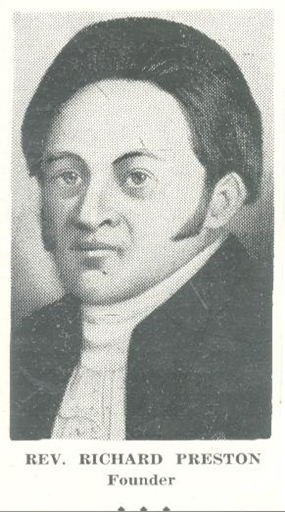The legacy of Richard Preston in 1854 lives on
In the late 1700s, Black Baptist fellowships were formed across Nova Scotia and into southern New Brunswick thanks to the efforts of David George, a Black preacher who escaped slavery in Virginia. However, the style of worship in these churches stirred up prejudiced criticism.
For example, Anglican catechist William Nesbitt gave the following interpretation: “God, they say, visibly interposed, freed them from their bondage, and secured them from future punishment. Thus nervous irritation, wrought up to epilepsy or hysteria, is put in the place of repentance and of correct conduct.”
Such sentiments implied the colonial society of the time could not tolerate Black-cultured worship styles. Black worshippers needed their own congregations – places of worship and association where they would not face worshippers of other cultures taking offence or expressing ridicule.
 Richard Preston, a Black refugee of the War of 1812, arrived in Nova Scotia around 1814. After the slave trade in the United States separated him from his mother in childhood, they reunited in Preston, N.S. While there, he became a regular at the Baptist Church in Halifax, which had a congregation of both Black and white people.
Richard Preston, a Black refugee of the War of 1812, arrived in Nova Scotia around 1814. After the slave trade in the United States separated him from his mother in childhood, they reunited in Preston, N.S. While there, he became a regular at the Baptist Church in Halifax, which had a congregation of both Black and white people.
However, white congregation members became increasingly dissatisfied with the growing number of Black congregants. This underscored the need for Black Baptists to have their own congregations.
Supported by his Halifax pastor, Preston went to England to be ordained. He returned in 1832 and established Cornwallis Street African Baptist Church (now known as New Horizons Baptist Church).
Over the next 22 years he helped establish 12 African Baptist churches across Nova Scotia. In 1854, Preston brought them together as the African Baptist Association of Nova Scotia (now known as the African United Baptist Association or AUBA).
This is the first known Black organization in Nova Scotia. Its establishment meant local Black Baptists could now feel a sense of ownership over their destiny. They had an institution established by Black people for Black people.
From an initial sisterhood of churches, by the 20th century the AUBA had developed formal boards and committees and established ministries to serve its association of churches. Today it’s the only known Black organization in Nova Scotia that does not rely on government funding.
It was highly unlikely in the 1800s and 1900s that an African Baptist member could attain a prominent role anywhere other than the Black church and the association. Even the boards and committees of what is now the Canadian Baptists of Atlantic Canada do not appear to have African Baptist members until the second half of the 20th century. Opportunities to hold positions in Black organizations such as the AUBA provided offices of prominence in a society where such opportunities were limited or unavailable.
The AUBA has been the fellowship focal point of Black Baptists in Nova Scotia for over 167 years. It has a rich heritage built by countless individuals deeply committed to their faith, and its significance lives on today. Thanks to the AUBA’s efforts, Black Baptists can feel a sense of ownership in a denominational association and freedom to express Black-cultured worship in their churches.
The original version of this article was written by Rev. Allister Johnson and published by Acadia Divinity College as part of African Heritage Month 2022. Johnson is associate pastor for Lucasville United Baptist Church, Lucasville, N.S. He was the church historian for Saint Thomas Baptist Church, North Preston and co-author of We’ve Come This Far by Faith: The History of Saint Thomas Baptist Church, published in 2016.